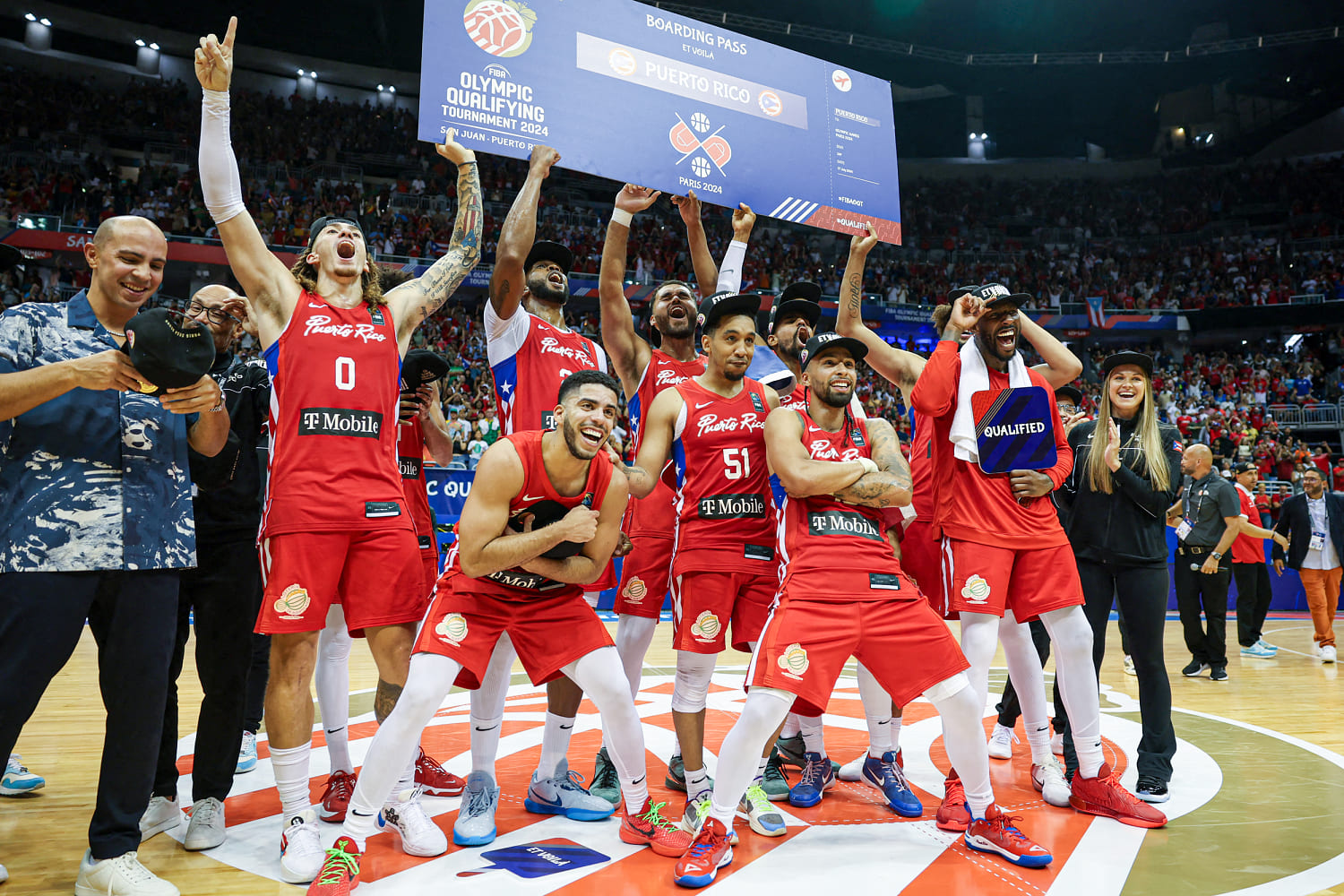
UPDATE (August 3, 2024, 1:20 p.m. ET): On Saturday, the U.S. men’s basketball team held off Puerto Rico, winning 104-83.
For the first time since 2004, the Puerto Rico men’s basketball team is playing in the Olympics. It hasn’t been a smooth ride: The team lost its first two games against South Sudan and Serbia. But on Saturday, the team has a chance to repeat what it did 20 years ago to the day: upset a United States team stacked with NBA superstars.
That historic 92-73 win in Athens, powered by a career game from guard Carlos Arroyo, is forever etched in Puerto Rico’s national history and cultural identity. On paper, a Paris repeat may seem impossible. This year’s U.S. team has more former NBA MVPs than any team in the Games’ history. The Americans are playing like defending Olympic champions and the U.S. is otherwise undefeated against Puerto Rico in all-time Olympic competition.
Not an Olympics goes by without people asking why Puerto Rico has Olympic teams and athletes in the first place.
“It’s never impossible,” Arroyo, now the team’s general manager, told CBS News last month about a repeat upset. “It’s just never impossible.” If the impossible indeed becomes possible on Saturday, it will remind the world that even though Puerto Ricans are U.S. citizens, sports sovereignty and pride might be the reasons why the U.S. colony might never become a state.
“The basketball is the weapon,” Flor Meléndez, the legendary assistant coach of that 2004 team, told me in Spanish for a podcast episode I reported in 2021. “We Puerto Ricans don’t have an army, but for us, that was the weapon we used to represent our country. The basketball jersey was our uniform. That is how I felt.”
Not an Olympics goes by without people asking why Puerto Rico has Olympic teams and athletes in the first place. The history is a complicated one, and every time a Puerto Rican experiences Olympic success, debates about identity and who gets to call themselves Puerto Rican follow. It is the constant tug and pull that affects an estimated 3.2 million Puerto Ricans living on the island and another 5.8 million who reside in the 50 states. That complexity extends Puerto Rico’s strong men’s basketball tradition, which wouldn’t have reached a golden age were it not for Puerto Ricans born and raised in cities like New York.
These conflicting impulses are particularly difficult to reconcile for the island’s most ardent supporters of statehood. Current Gov. Pedro Pierluisi and other statehood advocates hail Puerto Rico’s Olympic team even as they advocate for a political status that would essentially end the island’s proud sports sovereignty.
Statehood supporters argue the island can have both. It’s true that official Olympic representation is governed by the International Olympic Committee, which has considered Puerto Rico an official member since 1948. Edwin Jusino, a Puerto Rican historian who focuses on sports and supports statehood for Puerto Rico, pointed out that governments are not the arbiters of national teams. That falls on national olympic committees (NOCs) and their sporting federations. “These NOCs are supposed to be autonomous from each country and operate without direct government interference,” Jusino said, noting that the world’s top surfer, John John Florence, surfs for Hawaii in a professional league.
But Florence just competed in the 2024 Paris Games for — you guessed it — Team USA. If Puerto Rico were to become a state, there’s no reason to expect there would still be a Team Puerto Rico. In addition, in the specific case of international basketball, FIBA’s own 2021 statutes say that a national federation applying for membership must be “the controlling body of basketball in a country that is an independent state, recognized by the international community.” Puerto Rico became a FIBA member in 1957, but if it were to apply today, it wouldn’t be part of FIBA, and it would not be a member if statehood ever became a reality. (When I asked the IOC if it would still recognize Puerto Rico if it became a state, a spokesperson replied via email, “We cannot comment on speculations.”)
In the end, once again Puerto Rico is being ignored and misunderstood.
Still, that won’t stop statehood supporters from trying to twist the logic, as if the United States Olympic and Paralympic Committee (USOPC) would oblige. There is also the issue of American culture itself. At this moment in American politics, the rallying cry of “united we stand” has taken on xenophobic tones. It’s hard to believe that the United States, which has literally owned Puerto Rico since 1898, would be so magnanimous as to let Puerto Rico become a state and then keep sports sovereignty. The current Republican platform doesn’t even address Puerto Rico’s political status after years of supporting statehood. Democrats are still being criticized by Puerto Rico diaspora groups for not fully embracing the status question.
In the end, once again Puerto Rico is being ignored and misunderstood. Another nonbinding status plebiscite is scheduled for November, and statehood advocates should at least be honest with their fellow Puerto Ricans that statehood will be the end of sports sovereignty and national pride.
But Saturday in Paris, Puerto Ricans can briefly put those questions on hold. As I said at the end of my 2021 report about that upset in Athens 20 years ago:
2004 was before the hard times hit Puerto Rico: the debt, hurricanes, people leaving, political failures. This creeping feeling of failure, of no hope, because everywhere around you, you know, you’re not winning. So I think there’s something special about looking back at what happened in Athens, about these sports victories. They aren’t permanent. But that moment when the game is over, and Puerto Rico is on top, it tells people that yes, you can win.
The impossible has happened before. Why not again?

Leave a Reply